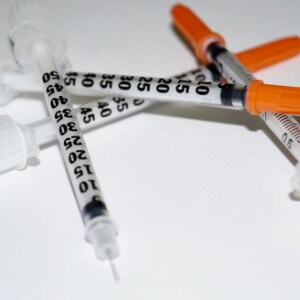Proper Needle Disposal
There are several medical conditions that may require individuals to use needles or sharps at home. After the sharp has been used, it is important that you take steps to dispose of it properly. Improper sharps disposal can cause injury not only for individuals in your household but for others in your community.
 The FDA recommends a two-step process for disposing of home-generated sharps:
The FDA recommends a two-step process for disposing of home-generated sharps:
- Place all needles and other sharps in a sharps disposal container immediately after use. This reduces the risk of needle sticks, cuts, and punctures from loose sharps. These containers should be kept out of reach of children and pets.
FDA-cleared sharps containers are the best option in which to place used sharps. These containers are made from rigid plastic and come marked with a line that indicates when the container should be considered full and be disposed of.
If an FDA-cleared container is not available, some household containers made of heavy-duty plastic may be considered an OK alternative. The container should be leak-resistant, remain upright during use, and have a tight-fitting puncture-resistant lid. Once the container is about 75% full you should duct tape the lid, label it as a sharps container, and dispose of the container.
 All sharps disposal containers should be:
All sharps disposal containers should be:
- Made of heavy-duty plastic
- Able to close with a tight-fitting, puncture-resistant lid, so sharps are not able to come out
- Upright and stable during storage and use
- Leak resistant
- Properly labeled to warn of hazardous waste inside the container
- Dispose of used sharps containers according to your community guidelines. In the city of Norwalk, sharps containers should be taped shut, marked with the word sharps, and placed inside your trash bag or trash can. Do not separate it from the rest of your trash, it must be inside the bag or can.
If you do not live in Norwalk, reach out to your solid waste hauler about their policy on disposing of sharps as they may offer a program to pick up your sharps containers or have different regulations. Ask your doctor or pharmacy if they have options for disposing of sharps containers.
About Rodney
Rodney Tuttle is the Director of Laboratory at Fisher-Titus. For more information on proper needle disposal, visit https://www.fda.gov/medical-devices/consumer-products/safely-using-sharps-needles-and-syringes-home-work-and-travel.
